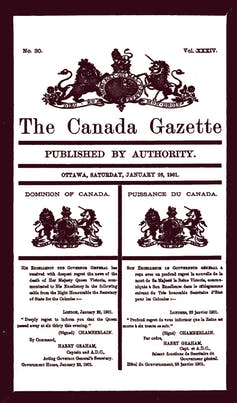Everyone should be concerned if the federal government bypasses the Canada Gazette

People gather to protest COVID-19 vaccine mandates and masking measures during a rally in Kingston, Ont., in November 2021. Ottawa's proposals to bypass publishing vaccine mandate guidelines goes against the principles of good governance. THE CANADIAN PRESS/Lars Hagberg
In late 2021, Labour Minister Seamus O’Regan signalled that his department would skip publication in the Canada Gazette of any new regulations on enforcing the federal government’s vaccine mandate for the core public service.
The Canada Gazette is the official publication of the Canadian government that publishes notices of statutes, regulations, proclamations and other business of government and Parliament.
As reported in the subscription-only Hill Times, O’Regan’s proposal to bypass the Gazette was apparently aimed at making good on Prime Minister Justin Trudeau’s October 2021 promise to ensure the well-being of Canadians by making sure public servants were vaccinated.
While the government consulted with select stakeholders on the measures, bypassing publication in the Gazette — an important first stage in the regulation process — undercuts good governance principles of transparency, accountability and public trust.
The Trudeau cabinet’s directive allowing for this exception is consistent with recent moves by the federal government away from traditional values of procedural fairness and caution in order to act swiftly during the pandemic.
In his 2020 report to the prime minister, the clerk of the Privy Council, who is the head of the public service and the body that supports cabinet in its work, stated:
“Agility is our mindset: as this global pandemic quickly evolves, so too will our response.”
In June 2021, Trudeau praised the public service for “finding innovative ways to support the government’s efforts” to mitigate the pandemic’s impact.
Quick government responses have been necessary during the pandemic. However, government agility and immediate responsiveness at the expense of procedural safeguards can have significant consequences. Dispensing with democratic checks is a step to be taken with caution and eyes wide open.
Statutes and regulations
A vital component of the rule of law is that governments can act only within the authority granted to them by national constitutions. Statutory power is the most important instrument governments possess to convert policy choices into action.
Statutes are formal exercises of government policy decisions that are passed by Parliament before implementation by the public service. Parliamentary scrutiny ensures elected governments are held to account, and that their actions are brought into public light.
In contrast, regulations are cabinet decisions taken in accordance with statutes to implement laws, and aren’t subject to the same level of parliamentary scrutiny.
Under the Statutory Instruments Act, regulations are examined by the clerk of the Privy Council and the deputy justice minister, not Parliament, to ensure compliance with Canada’s Constitution and Parliament’s statutory authority prior to taking effect. Regulations become public when published in the Canada Gazette.

People line up for their vaccination appointments outside an ice hockey arena to receive their COVID-19 booster shots at Jabapalooza, a pop-up vaccine clinic, in Ottawa in December 2021.
THE CANADIAN PRESS/Justin Tang
Importance of Gazette publication
Canada Gazette publication of regulations before they take effect evolved as a standard and recognized system of announcing these decisions to the public and inviting input on them. Although there are exceptions to this process, it’s the accepted convention.

A 1901 edition of the Canada Gazette.
Government of Canada
The government must respond to the public input before registering the regulations with the clerk of the Privy Council and posting the regulations and response in the Gazette. The regulations are publicly distributed after approval by the governor general.
After coming into force, regulations are reviewed by a parliamentary committee that may recommend changes to the regulatory authority if a problem is found. If the two bodies cannot agree on a solution, Parliament can recommend disallowance of the regulation. However, revoking regulations can be difficult.
Skipping publication in the Canada Gazette dispenses with a time-honoured procedural safeguard that allows these decisions to be known to both Parliament and the public.
This leads to an interesting twist of potential relevance here. If regulations aren’t published in the Gazette, they’re still valid.
But they’re also in violation of the democratic principle that all laws must be knowable to the public. Violating that principle means that members of public cannot be subject to penalty for failure to comply.
In essence, they’re not enforceable because citizens don’t know about their responsibilities under the regulations if they aren’t first published in the Gazette.
Questions, consequences for democracy
Canadian democratic practices have developed over hundreds of years to prevent the misuse of government power and to build public trust. They ensure that expediency does not override transparency, accountability and good governance.
The question for Canadians is whether expediency warrants the avoidance of process and democratic safeguards.

Prime Minister Justin Trudeau receives his COVID-19 vaccine booster shot at a pharmacy in Ottawa.
THE CANADIAN PRESS/Sean Kilpatrick
The current proposal to go around the Gazette may appear necessary for the government to act quickly to ensure vaccine mandates are observed. But is such urgency really warranted given the government promise has already been delayed for more than two months?
Is there a compelling reason not to publish the regulations and receive public input when the government has proclaimed loudly to its workforce that everyone must be vaccinated or face consequences? Or is it engaging in meaningless action if the regulations aren’t enforceable, thereby taking public credit for tough action but evading responsibility for actual enforcement?
The most important implications of this proposal are for the longer term because dispensing with safeguards in our system can open the door to future government actions being taken without regard for checks on the use of power.
In our view, bypassing the Canada Gazette for such important regulations is contrary to good governance and could erode public trust in government.

The authors do not work for, consult, own shares in or receive funding from any company or organization that would benefit from this article, and have disclosed no relevant affiliations beyond their academic appointment.







